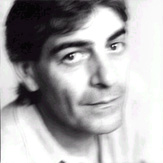






The Simple Things He Said
 If anyone ever
compiled a list of the most influential figures in international music, Gabriel Yacoub would likely be at the top.
If anyone ever
compiled a list of the most influential figures in international music, Gabriel Yacoub would likely be at the top.
His name often comes up as someone highly regarded in the realm of World Music -- even though Yacoub himself is not particularly fond of the term. However,
since his early musical days as a guitarist with Alan Stivell, then through the 70's fronting the band Malicorne, and
on his own solo musical career, Yacoub has spent over three decades incorporating traditional songs and instruments into his repertoire. He
also includes his own elegant, provocative songwriting to the mix, which has caught the attention of fellow musicians and listeners alike.
He shows no signs of slowing down. Last year, Yacoub released two new albums: Yacoub in France, and a North America-only release,
The Simple Things We Said (first released on PrimeCD and now distributed by Yacoub's
own company, Simple). The latter album contains a collection of some of Yacoub's best-known songs presented
in their raw, acoustic splendour, along with some traditional tunes, and a few songs in English.
In fact, the album's title track is a translation of what has become Yacoub's signature song, "Les Choses Les Plus Simples,"
thanks to its coverage by none other than a duet between American folk legend Joan Baez and French
singer/songwriter Maxime Le Forestier.
I caught up with Gabriel Yacoub over the phone when he was touring the United States in April. He was in New York taking a few days off, just after opening
his opening dates in Philadelphia. He sounded soft-spoken and humble, perhaps not fully aware of the fact that he is one of the most respected singer/songwriters in
both folk and World music.
Next page > Gabriel Yacoub: Part Two >
Photo by Serge Picard













 If anyone ever
compiled a list of the most influential figures in international music, Gabriel Yacoub would likely be at the top.
If anyone ever
compiled a list of the most influential figures in international music, Gabriel Yacoub would likely be at the top.